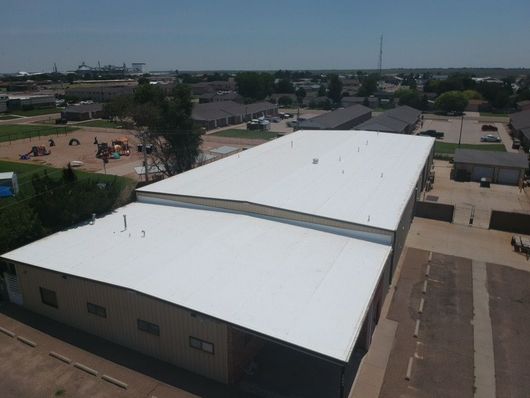Choosing the proper industrial roofing system is essential for protecting your property and enhancing its longevity. In this article, we’ll walk you through the key factors in selecting the right roofing system and maintaining it properly to avoid costly mistakes.
Key Considerations for Industrial Roofing Projects
Because industrial roofing projects are complex, understanding the unique requirements of your property is essential. Here are the key factors to consider:
- Building Use: The type of building determines roofing needs, whether for heat resistance, weather protection, or soundproofing. Consider the building's use to select the appropriate roofing material.
- Environmental Conditions: Consider your local climate—extreme temperatures, heavy rainfall, or snow can all affect roofing materials. Select a roofing system designed to handle these conditions.
- Budget: Industrial roofing can be a significant investment. Balancing quality with cost-effective options ensures you get the best value for your investment.
- Energy Efficiency: Choosing energy-efficient roofing can reduce long-term utility costs. Consider materials that help improve insulation and lower heating and cooling expenses.
Types of Industrial Roofs: Built-Up, Metal, and Modified Bitumen
Industrial buildings often use specific roofing systems. Below are some of the most common types that provide advantages based on the structure's needs.
Built-Up Roofs (BUR)
Built-up roofing systems (BUR) are composed of several layers of materials, such as tar and gravel, providing excellent waterproofing and durability. However, this system can be complex and labor-intensive to install.
Metal Roofs
Metal roofing is a durable and low-maintenance option that performs well in extreme weather. Its reflective properties also improve energy efficiency by reducing cooling costs. Metal roofs come in multiple materials, including steel, aluminum, and copper.
Modified Bitumen Roofs
Modified bitumen combines asphalt with rubber or plastic polymers, resulting in a flexible and durable roofing solution for low-slope buildings. Its resistance to leaks makes it a reliable choice for industrial structures.
Maintenance Tips to Extend the Life of Your Industrial Roof
To avoid costly repairs and extend the lifespan of your industrial roof, regular maintenance is crucial. Follow these tips to keep your roof in excellent condition:
- Regular Inspections: Regular inspections by professionals can help detect early issues like cracks, leaks, or debris accumulation before they turn into major problems.
- Clean Gutters and Drains: Keep gutters and drains free of debris to avoid water accumulation that could damage your roof.
- Prompt Repairs: Address any issues quickly to prevent further damage. Delaying repairs can result in larger, more expensive problems later.
- Coating and Sealing: Applying coatings and sealants to your roof helps guard against moisture and UV damage, prolonging its lifespan.
Why You Should Hire a Specialized Roofing Contractor for Your Industrial Roof
Hiring a specialized roofing contractor is essential for ensuring your roof is installed correctly and maintained properly. Experts can help you choose materials, manage the project, and provide long-term support.
Conclusion: Choosing the Right Roofing for Your Business
Selecting the right industrial roof is key to safeguarding your property and ensuring it lasts long-term. Understanding your options—BUR, metal, or modified bitumen—will guide your decision. With a specialized contractor, you can ensure optimal installation and maintenance for years of protection.
Need help with your industrial roofing project? Contact us today for expert advice and a tailored solution to meet your needs!

#IndustrialRoofing #CommercialRoofing #RoofInstallation #BuiltUpRoof #MetalRoofing #ModifiedBitumen #RoofMaintenance #EnergyEfficientRoofing